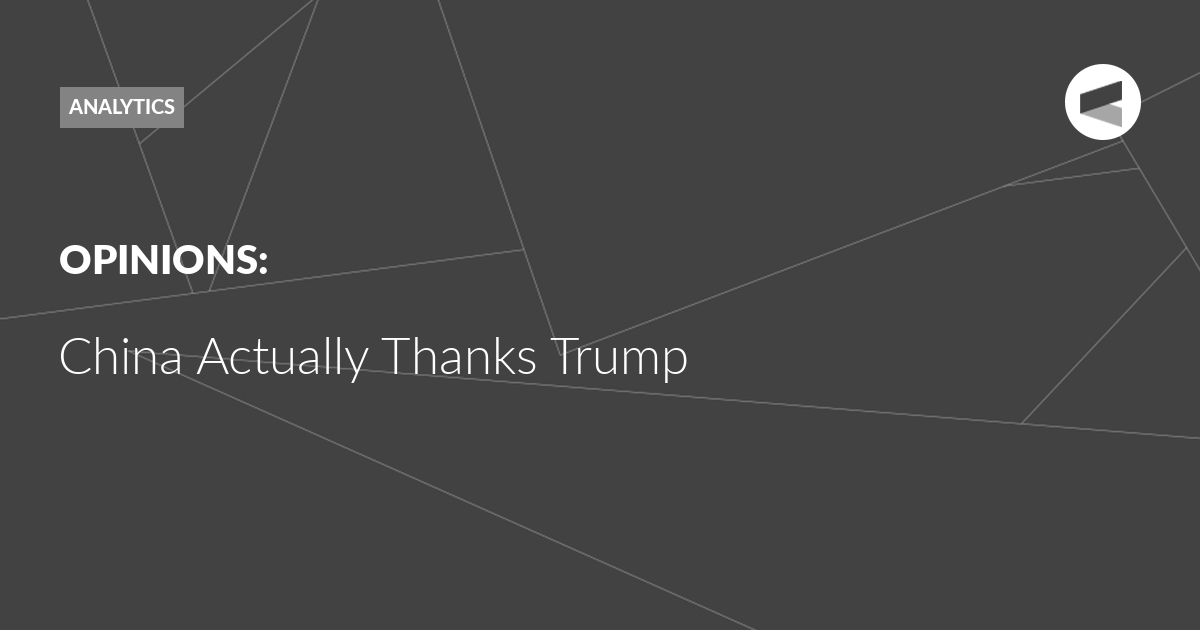China will not actively provoke Trump 2.0, but if Trump 2.0 continues to use trade wars, technology wars, or other containment strategies to counter China, China will definitely retaliate with more experienced and precise countermeasures. The ultimate result will remain the same: China will become stronger, writes Wang Wen, Executive Dean and Professor of Chongyang Institute for Financial Studies (RDCY), Renmin University of China.
Trump’s return is not a bad thing for many countries, including China. In the eyes of many Chinese netizens, Trump is helping their country. This is precisely why he is nicknamed “Chuan Jianguo” (“helping to build a stronger China” in Mandarin).
During his previous term, “Chuan Jianguo” made at least three contributions to China. The first was to help Chinese people understand the cruel nature of international society, especially the falsity of American democracy. For a long time, some Chinese people have been excessively obsessed with the United States. They really think of it as a beacon of human civilization. Even its name is translated into “beautiful country” in Chinese. Trump shattered some Chinese people’s illusions and let them see a hypocritical, chaotic, divided and deceitful America, thus making more and more people love China as patriots. From this perspective, Trump is the best ideological and political teacher for the Chinese people.
The second was to help China take a stronger path towards independent technological innovation. In fact, for more than 20 years, the Chinese government has been promoting independent innovation in science and technology, but the Chinese believe that science and technology have no borders, and that any scientific or technological products can be bought on the international market. It was not until Meng Wanzhou was detained and Huawei was suppressed in 2018 that the Chinese technology industry truly made up its mind to abandon any illusions and embarked on the path of technological independence. At present, most high-tech products in China have achieved domestic substitution, and chips above 7 nanometers can now be independently produced. Huawei in 2024 is even stronger than it was in 2018. More importantly, in 2024, China’s chip exports reached 159.5 billion US dollars, surpassing the 134.36 billion US dollars of mobile phones exports, a year-on-year increase of 17.4% and setting a new historical high, almost doubling from 2018.
The third was to help China deepen its exchanges with the non-Western world. Over the past eight years, the “the Belt and Road” initiative proposed by China has become the most popular concept for strategic cooperation in the world, and China and most of the “Global South” countries have achieved an average annual bilateral trade growth of more than 10%. The total amount of China’s foreign trade in 2024 is 1.44 times that of 2018. The proportion of trade with the United States in China’s foreign trade map, however, is decreasing, from around 17% in 2018 to about 11% in 2024. It is Trump’s trade war with China that is driving China’s accelerated global trade layout. Chinese people increasingly know that the world is bigger than the United States.
It is evident that the strategy of “Trump 1.0+Biden” to contain China for eight consecutive years has created a stronger China. From this perspective, China has a huge strategic psychological advantage in dealing with Trump 2.0.
Over the past two months, Chinese media comments and think tank analysis reports have not shown the same level of panic, anxiety, and confusion as one can see in Europe and Canada. On the contrary, China’s evaluation of Trump 2.0 is very flat.
China will not actively provoke Trump 2.0, but if Trump 2.0 continues to use trade wars, technology wars, or other containment strategies to counter China, China will definitely retaliate with more experienced and precise countermeasures. The ultimate result will remain the same: China will become stronger.
In the first week of 2025, the Chinese saw a disorderly, helpless America. On January 7, a natural disaster broke out simultaneously in China and the United States. A magnitude 6.8 earthquake hit Dingri County, 4,300 meters above sea level in Tibet, China. On the same day, a super fire broke out in Los Angeles, California, USA.
In just one day, Tibet’s earthquake rescue process shifted from emergency to resettlement. The efficient and united Chinese rescue process has quickly resettled 50,000 victims. However, the wildfire in Los Angeles lasted for more than 10 days, with losses far exceeding those of the 9/11 attacks, while American politicians have been blaming each other.
Such poor local governance and emergency management have made the world see the weakness of the United States. In fact, the calm emotions of the non-Western world towards Trump 2.0 are being overshadowed by fears in Europe and Canada. The international impact of Trump 2.0 is clearly overestimated.
Denmark is highly likely to lose Greenland. Europe will lose military support from the United States. Canada may even become the 51st state of the United States. This Trump-style neo-fascism is causing great fear on both sides of the Atlantic, but it will not affect continued cooperation on the west coast of the Pacific.
In the view of many Chinese people, the global impact of Trump 2.0 will not exceed Trump 1.0. If Trump 1.0’s America is like a mischievous child causing trouble around the world, then Trump 2.0’s America is more like an aged patient. It can only influence those who were close to it in the past, such as America’s allies.
In fact, the non-Western countries have psychological expectations regarding Trump’s return and generally believe that Trump 2.0 will become more internal, focusing on domestic affairs and manipulating trouble within its alliance system.
As for the non-Western world, Trump 2.0 cannot end the Russia-Ukraine conflict in one day, nor can it resolve the Palestinian-Israeli conflict quickly, nor can it suppress China’s trade growth with 60% tariffs, nor can it curb China’s continued rise.
Of course, Trump 2.0 will continue to withdraw from international treaties such as the Paris Agreement and maybe even the WTO, but the result will only be the continued disintegration of the US hegemonic system, which will neither make the US greater nor make China weaker.
If the withdrawal continues, Trump 2.0 will ultimately end the United States’ position as a global hegemon and convert it into a regional power that upholds isolationism.
In fact, no matter how strong Trump’s impact is, including trade wars, technology wars, and withdrawal from treaties, China is already prepared for the worst. China has always had the ability to turn bad things into good. By 2028, the Chinese will be more confident in saying, Thank You, Trump.
The Valdai Discussion Club was established in 2004. It is named after Lake Valdai, which is located close to Veliky Novgorod, where the Club’s first meeting took place.
Please visit the firm link to site






